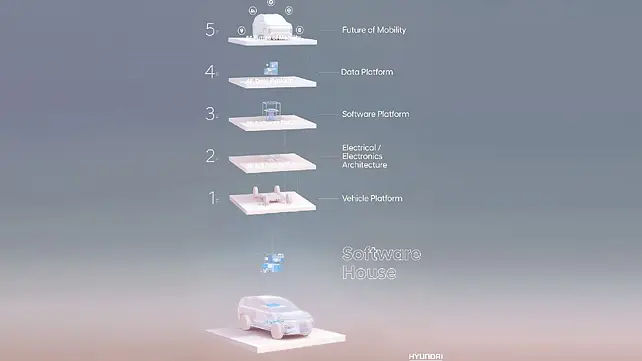
Hyundai Motor Group has announced a new global strategy to transform all vehicles to Software Defined Vehicles (SDVs) by 2025. The OEM claims that SDVs will give its customers the freedom to remotely upgrade the performance and functionality of their vehicles anywhere at any time.
Expecting 20 million vehicles to be registered on its Connected Car Services (CCS) worldwide by 2025, Hyundai will enable Over-The-Air (OTA) software updates for all models by the same year. The OEM will also invest 18 trillion won by 2030 in a Global Software Centre and R&D headquarter to bolster software capabilities for SDV development, the company said today.
Chung Kook Park, President and Head of R&D Division, Hyundai Motor Group said all newly launched Hyundai vehicles will be equipped to receive OTA software updates staring 2023. “Creating visionary vehicles empowered with the ability to evolve through software will enable customers to keep their vehicles up to date with the latest features and technology long after they have left the factory.”
Starting next year, the South Korean group will also offer FoD (Feature on Demand) services that will give customers the ability to select and purchase functions and features that meet their needs and tastes. Data collected from the vehicles will be used by the OEM for the further development of personalised services. The data computation and collection is being done in collaboration with NVIDIA, the company stated.

Electric Vehicle Plans
In 2025, Hyundai will also introduce two new EV platforms – eM and eS – that will be created under the Group’s Integrated Modular Architecture (IMA) system. The eM platform is being developed specifically for EVs across all segments and will provide a 50% improvement in driving range on a single charge compared to current EVs, Hyundai said. Further, it will also support Level 3 or higher autonomous driving technology and OTA software update features.
The eS platform, on the other hand, will be developed as an EV ‘skateboard’ exclusively for Purpose Built Vehicles (PBVs), with a fully flexible structure to meet B2B demands, and provide tailor-made solutions for companies operating in the delivery, logistics, and car-hailing sectors, said Paul Choo, Executive Vice President of Head of Electronics & Infotainment Development Center, Hyundai Motor Group.
“These new platforms are evolving under Hyundai Motor Group's 'Integrated Modular Architecture, which will lead to further standardisation and modularisation of core components of electric vehicles, such as batteries and motors, while offering advantages in sectors additional to electric vehicles,” he said.
The infotainment and Advanced Driver Assistance System (ADAS) that the Group already mass-produced are both currently undergoing function advancements with the introduction of the latest integrated controller technology. Hyundai is also building a new data platform that can combine and process data generated throughout the vehicle’s entire life cycle, including manufacturing, production, and operation, which will be used to create a broad range of innovative services.
Eunsook Jin, Executive Vice President and Head of ICT Innovation Division, Hyundai Motor Group, said, “Hyundai Motor Group's data platform will not only be simply for driving. It will also play an important role in enhancing the convenience and diversity of the customer's mobility experience by engaging throughout the vehicle's entire life cycle.'